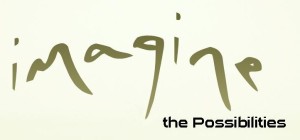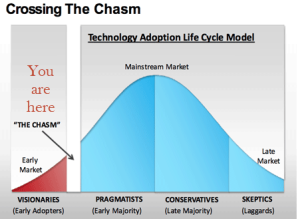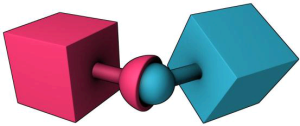Sep 30 2015
DAY 17 – 30 Days To The New Economy
Your Role In History As An Entrepreneur
Adapted from the book 30 DAYS TO THE NEW ECONOMY written and published by Peggy Salvatore
Imagine Finance
Financing in the New Economy has two radical differentiators from the old days. One is the way in which you attract investors and the second is how much it actually costs to start up your Internet business.
Direct Access to Investors
Remember the good old days (say the first decade of the 21st Century) when prospective entrepreneurs seeking funding would schlep their slide decks into a startup incubator and make presentations to veteran investor gatekeepers who doled out wisdom about business plans, management teams and boards of directors?
- Gone? Not quite. Still the #1 startup funding path? No longer!
With crowdsourcing and crowdfunding ideas like Kickstarter and IndieGoGo, you can fund your idea by throwing it out to the Internet and letting the investors come to you. You can raise a little money taking donations and small sums from interested Internet friends and advocates, or you can raise serious millions using more structured funding mechanisms that require investors to meet certain criteria.
- For an entrepreneur in the New Economy, this simply means that Internet Joe can bypass more traditional and restrictive funding mechanisms and go straight to the public. Or combine them both and aim for Shark Tank!
Startup Investment is Minimal
As an entrepreneur in the New Economy, Internet Joe has nearly limitless and cheap/free resources at his fingertips – those fingertips tapping on the keyboard. You can start up a business idea with minimal capital. And you can get world-class advice for the price of an Internet connection.
- I will explore some of these resources in greater detail in the next book, but for now suffice to know that there are brilliant people sharing their startup knowledge for nothin’. The saying “you get what you pay for” does not hold in this case.
- This rich vein of Internet resources is the exception that proves the rule. In fact, the incredible free startup advice and business acumen, market research and tools to reach a global market cost close to no money at all. Remember the more you chase money, the less time and energy is available to make your business work!
In his program, Product Launch Formula, Jeff Walker shares the secret that you can actually sell products that you haven’t yet developed. You sell the product then develop or produce it in response to buyers. The only catch–the big asterisk–is that you better know what you are doing so you can deliver when the time comes. Selling lamps? You’d better be able to produce them when the orders come rolling in.
- The idea is not sleazy; it’s actually excellent business advice that has been around for decades: Develop your prototypes and first generation iterations of products and services in cooperation with your customers.
- By designing products as you sell them, you are developing products the marketplace actually wants and needs.
Transactions: Global, virtual, no boundaries
A favorite New Economy guru is Ray Kurzweil, the innovative genius who wrote the seminal work regarding all things future, The Singularity is Near. In his 2005 epic work, he straightened out my main misconception about the global economy. I had been stuck in the idea that all money and value is tied to concrete productivity. I was just plain wrong.
- Kurzweil perceived that the value of the Internet changed the definition of value. Money has changed because it is now a fluid concept based on the nearly limitless possibilities of the global computer mind which creates exponential relationships that expand past our individual ability to make connections.
- Given that premise, he predicted the Dow Jones Industrial Average (DJIA) would triple in ten years. In 2005, it stood at a then-unprecedented 10,000 and, to some, was wildly over-valued–the stock market tripling seemed ludicrous.
- Then in 2008, the global economy crashed and bubbles like the real estate market burst. Also, the dry bulk index hit an all-time low, indicating that global shipping crashed. What did the DJIA do in response? It rose, and continues to rise.
Traditionalists scratch their heads. But futurists just sit back and wait because they know that the measure of value has changed and the DJIA reflects latent value as the economy rearranges itself. In 2015, the DJIA stood at 18,000 and traditional watchers shook their heads saying it continued to be overvalued.
For those who are stuck in the worlds of the dry bulk index and the movement of tangibles in the market, the stock market ascent appears to be smoke and mirrors. When I read Kurzweil I understood, finally, that my attachment to things like physical products and national monetary systems were outdated.
Finance in the New Economy is global and virtual, but it doesn’t mean it isn’t real. Quite the opposite. The inherent value in the instantaneous transmission of knowledge and the ability to transact with anyone, anywhere, anytime has reinvented the basis of the financial system.
As Internet Joe builds his business on this very solid foundation of the virtual New Economy, he is plugging into nearly limitless abundance.
The new rules of finance have yet to be solidified. Entrepreneurs are writing them AS they build the New Economy.
# # #
C’mon back TOMORROW 10/1 for Day 18.
YOU think great MARKETING that works is simply pulled out of a hat?
# # #
S P E C I A L A N N O U N C E M E N T
Sign up NOW for NOVEMBER 29th (Sunday Night after Thanksgiving)
LIMITED SEATING COACHING WEBINAR:
“ENTREPRENEURS ARE AGENTS OF CHANGE . . . Accelerating Your Business”
Get fresh, informed, proven insights geared specifically to your business market, your biggest problems, your biggest opportunities.
With Hal and Peggy’s wealth of business coaching experience, you’ll learn how YOU match up with what successful entrepreneurs are thinking and doing RIGHT NOW. Get ideas you never imagined. Gain the traction you need within 2 hours — not days or weeks or months. Simply call 931.854.0474 Central Time: 11AM to 4PM Monday-Friday for details, to explain your business pursuit focus and to reserve your seat! $99 total for 2 hours. Satisfaction Guaranteed.
———-
For more information on Peggy Salvatore’s book: 30 Days to the New Economy [© Peggy Salvatore 2015. All Rights Reserved.] click on ENTREPRENEUR NEWS or visit ow.ly/RysnP for the E-book
# # #
Hal@Businessworks.US Peggy@Businessworks.US
Open Minds Open Doors
Thanks for your visit and make today a GREAT day for someone!




















